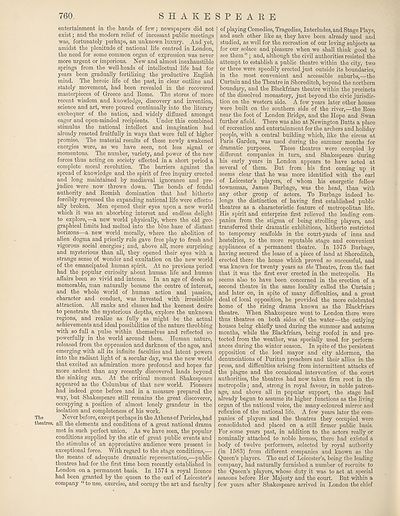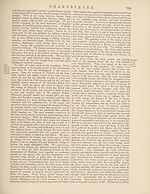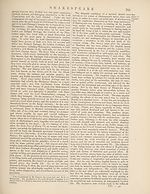Encyclopaedia Britannica > Volume 21, ROT-Siam
(770) Page 760
Download files
Complete book:
Individual page:
Thumbnail gallery: Grid view | List view

760
SHAKESPEARE
entertainment in the hands of few; newspapers did not
exist; and the modern relief of incessant public meetings
was, fortunately perhaps, an unknown luxury. And yet,
amidst the plenitude of national life centred in London,
the need for some common organ of expression was never
more urgent or imperious. New and almost inexhaustible
springs from the well-heads of intellectual life had for
years been gradually fertilizing the productive English
mind. The heroic life of the past, in clear outline and
stately movement, had been revealed in the recovered
masterpieces of Greece and Rome. The stores of more
recent wisdom and knowledge, discovery and invention,
science and art, were poured continually into the literary
exchequer of the nation, and widely diffused amongst
eager and open-minded recipients. Under this combined
stimulus the national intellect and imagination had
already reacted fruitfully in ways that were full of higher
promise. The material results of these newly awakened
energies were, as we have seen, not less signal or
momentous. The number, variety, and power of the new
forces thus acting on society effected in a short period a
complete moral revolution. The barriers against the
spread of knowledge and the spirit of free inquiry erected
and long maintained by mediaeval ignorance and pre¬
judice were now thrown down. The bonds of feudal
authority and Romish domination that had hitherto
forcibly repressed the expanding national life were effectu¬
ally broken. Men opened their eyes upon a new world
which it was an absorbing interest and endless delight
to explore, —a new world physically, where the old geo¬
graphical limits had melted into the blue haze of distant
horizons—a new world morally, where the abolition of
alien dogma and priestly rule gave free play to fresh and
vigorous social energies; and, above all, more surprising
and mysterious than all, they opened their eyes with a
strange sense of wonder and exultation on the new world
of the emancipated human spirit. At no previous period
had the popular curiosity about human life and human
affairs been so vivid and intense. In an age of deeds so
memorable, man naturally became the centre of interest,
and the whole world of human action and passion,
character and conduct, was invested with irresistible
attraction. All ranks and classes had the keenest desire
to penetrate the mysterious depths, explore the unknown
regions, and realize as fully as might be the actual
achievements and ideal possibilities of the nature throbbing
with so full a pulse within themselves and reflected so
powerfully in the world around them. Human nature,
released from the oppression and darkness of the ages, and
emerging with all its infinite faculties and latent powers
into the radiant light of a secular day, was the new world
that excited an admiration more profound and hopes far
more ardent than any recently discovered lands beyond
the sinking sun. At the critical moment Shakespeare
appeared as the Columbus of that new world. Pioneers
had indeed gone before and in a measure prepared the
way, but Shakespeare still remains the great discoverer,
occupying a position of almost lonely grandeur in the
isolation and completeness of his work.
The Never before, except perhaps in the Athens of Pericles, had
theatres, all the elements and conditions of a great national drama
met in such perfect union. As we have seen, the popular
conditions supplied by the stir of great public events and
the stimulus of an appreciative audience were present in
exceptional force. With regard to the stage conditions,—
the means of adequate dramatic representation,—public
theatres had for the first time been recently established in
London on a permanent basis. In 1574 a royal licence
had been granted by the queen to the earl of Leicester’s
company “ to use, exercise, and occupy the art and faculty |
of playing Comedies, Tragedies, Interludes, and Stage Plays,
and such other like as. they have been already used and
studied, as well for the recreation of our loving subjects as
for our solace and pleasure when we shall think good to
see them ” ; and, although the civil authorities resisted the
attempt to establish a public theatre within the city, two
or three were speedily erected just outside its boundaries,
in the most convenient and accessible suburbs,—the
Curtain and the Theatre in Shoreditch, beyond the northern
boundary, and the Blackfriars theatre within the precincts
of the dissolved monastery, just beyond the civic jurisdic¬
tion on the western side. A few years later other houses
were built on the southern side of the river,—the Rose
near the foot of London Bridge, and the Hope and Swan
further afield. There was also at Newington Butts a place
of recreation and entertainment for the archers and holiday
people, with a central building which, like the circus at
Paris Garden, was used during the summer months for
dramatic purposes. These theatres were occupied by
different companies in turn, and Shakespeare during
his early years in London appears to have acted at
several of them. But from his first coming up it
seems clear that he was more identified with the earl
of Leicester’s players, of whom his energetic fellow
townsman, James Burbage, was the head, than with
any other group of actors. To Burbage indeed be¬
longs the distinction of having first established public
theatres as a characteristic feature of metropolitan life.
His spirit and enterprise first relieved the leading com¬
panies from the stigma of being strolling players, and
transferred their dramatic exhibitions, hitherto restricted
to temporary scaffolds in the court-yards of inns and
hostelries, to the more reputable stage and convenient
appliances of a permanent theatre. In 1575 Burbage,
having secured the lease of a piece of land at Shoreditch,
erected there the house which proved so successful, and
was known for twenty years as the Theatre, from the fact
that it was the first ever erected in the metropolis. He
seems also to have been concerned in the erection of a
second theatre in the same locality called the Curtain;
and later on, in spite of many difficulties, and a great
deal of local opposition, he provided the more celebrated
home of the rising drama known as the Blackfriars
theatre. When Shakespeare went to London there were
thus theatres on both sides of the water—the outlying
houses being chiefly used during the summer and autumn
months, while the Blackfriars, being roofed in and pro¬
tected from the weather, was specially used for perform¬
ances during the winter season. In spite of the persistent
opposition of the lord mayor and city aldermen, the
denunciations of Puritan preachers and their allies in the
press, and difficulties arising from intermittent attacks of
the plague and the occasional intervention of the court
authorities, the theatres had now taken firm root in the
metropolis; and, strong in royal favour, in noble patron¬
age, and above all in popular support, the stage had
already begun to assume its higher functions as the living
organ of the national voice, the many-coloured mirror and
reflexion of the national life. A few years later the com¬
panies of players and the theatres they occupied were
consolidated and placed on a still firmer public basis.
For some years past, in addition to the actors really or
nominally attached to noble houses, there had existed a
body of twelve performers, selected by royal authority
(in 1583) from different companies and known as the
Queen’s players. The earl of Leicester’s, being the leading
company, had naturally furnished a number of recruits to
the Queen’s players, whose duty it was to act at special
seasons before Her Majesty and the court. But within a
few years after Shakespeare arrived in London the chief
SHAKESPEARE
entertainment in the hands of few; newspapers did not
exist; and the modern relief of incessant public meetings
was, fortunately perhaps, an unknown luxury. And yet,
amidst the plenitude of national life centred in London,
the need for some common organ of expression was never
more urgent or imperious. New and almost inexhaustible
springs from the well-heads of intellectual life had for
years been gradually fertilizing the productive English
mind. The heroic life of the past, in clear outline and
stately movement, had been revealed in the recovered
masterpieces of Greece and Rome. The stores of more
recent wisdom and knowledge, discovery and invention,
science and art, were poured continually into the literary
exchequer of the nation, and widely diffused amongst
eager and open-minded recipients. Under this combined
stimulus the national intellect and imagination had
already reacted fruitfully in ways that were full of higher
promise. The material results of these newly awakened
energies were, as we have seen, not less signal or
momentous. The number, variety, and power of the new
forces thus acting on society effected in a short period a
complete moral revolution. The barriers against the
spread of knowledge and the spirit of free inquiry erected
and long maintained by mediaeval ignorance and pre¬
judice were now thrown down. The bonds of feudal
authority and Romish domination that had hitherto
forcibly repressed the expanding national life were effectu¬
ally broken. Men opened their eyes upon a new world
which it was an absorbing interest and endless delight
to explore, —a new world physically, where the old geo¬
graphical limits had melted into the blue haze of distant
horizons—a new world morally, where the abolition of
alien dogma and priestly rule gave free play to fresh and
vigorous social energies; and, above all, more surprising
and mysterious than all, they opened their eyes with a
strange sense of wonder and exultation on the new world
of the emancipated human spirit. At no previous period
had the popular curiosity about human life and human
affairs been so vivid and intense. In an age of deeds so
memorable, man naturally became the centre of interest,
and the whole world of human action and passion,
character and conduct, was invested with irresistible
attraction. All ranks and classes had the keenest desire
to penetrate the mysterious depths, explore the unknown
regions, and realize as fully as might be the actual
achievements and ideal possibilities of the nature throbbing
with so full a pulse within themselves and reflected so
powerfully in the world around them. Human nature,
released from the oppression and darkness of the ages, and
emerging with all its infinite faculties and latent powers
into the radiant light of a secular day, was the new world
that excited an admiration more profound and hopes far
more ardent than any recently discovered lands beyond
the sinking sun. At the critical moment Shakespeare
appeared as the Columbus of that new world. Pioneers
had indeed gone before and in a measure prepared the
way, but Shakespeare still remains the great discoverer,
occupying a position of almost lonely grandeur in the
isolation and completeness of his work.
The Never before, except perhaps in the Athens of Pericles, had
theatres, all the elements and conditions of a great national drama
met in such perfect union. As we have seen, the popular
conditions supplied by the stir of great public events and
the stimulus of an appreciative audience were present in
exceptional force. With regard to the stage conditions,—
the means of adequate dramatic representation,—public
theatres had for the first time been recently established in
London on a permanent basis. In 1574 a royal licence
had been granted by the queen to the earl of Leicester’s
company “ to use, exercise, and occupy the art and faculty |
of playing Comedies, Tragedies, Interludes, and Stage Plays,
and such other like as. they have been already used and
studied, as well for the recreation of our loving subjects as
for our solace and pleasure when we shall think good to
see them ” ; and, although the civil authorities resisted the
attempt to establish a public theatre within the city, two
or three were speedily erected just outside its boundaries,
in the most convenient and accessible suburbs,—the
Curtain and the Theatre in Shoreditch, beyond the northern
boundary, and the Blackfriars theatre within the precincts
of the dissolved monastery, just beyond the civic jurisdic¬
tion on the western side. A few years later other houses
were built on the southern side of the river,—the Rose
near the foot of London Bridge, and the Hope and Swan
further afield. There was also at Newington Butts a place
of recreation and entertainment for the archers and holiday
people, with a central building which, like the circus at
Paris Garden, was used during the summer months for
dramatic purposes. These theatres were occupied by
different companies in turn, and Shakespeare during
his early years in London appears to have acted at
several of them. But from his first coming up it
seems clear that he was more identified with the earl
of Leicester’s players, of whom his energetic fellow
townsman, James Burbage, was the head, than with
any other group of actors. To Burbage indeed be¬
longs the distinction of having first established public
theatres as a characteristic feature of metropolitan life.
His spirit and enterprise first relieved the leading com¬
panies from the stigma of being strolling players, and
transferred their dramatic exhibitions, hitherto restricted
to temporary scaffolds in the court-yards of inns and
hostelries, to the more reputable stage and convenient
appliances of a permanent theatre. In 1575 Burbage,
having secured the lease of a piece of land at Shoreditch,
erected there the house which proved so successful, and
was known for twenty years as the Theatre, from the fact
that it was the first ever erected in the metropolis. He
seems also to have been concerned in the erection of a
second theatre in the same locality called the Curtain;
and later on, in spite of many difficulties, and a great
deal of local opposition, he provided the more celebrated
home of the rising drama known as the Blackfriars
theatre. When Shakespeare went to London there were
thus theatres on both sides of the water—the outlying
houses being chiefly used during the summer and autumn
months, while the Blackfriars, being roofed in and pro¬
tected from the weather, was specially used for perform¬
ances during the winter season. In spite of the persistent
opposition of the lord mayor and city aldermen, the
denunciations of Puritan preachers and their allies in the
press, and difficulties arising from intermittent attacks of
the plague and the occasional intervention of the court
authorities, the theatres had now taken firm root in the
metropolis; and, strong in royal favour, in noble patron¬
age, and above all in popular support, the stage had
already begun to assume its higher functions as the living
organ of the national voice, the many-coloured mirror and
reflexion of the national life. A few years later the com¬
panies of players and the theatres they occupied were
consolidated and placed on a still firmer public basis.
For some years past, in addition to the actors really or
nominally attached to noble houses, there had existed a
body of twelve performers, selected by royal authority
(in 1583) from different companies and known as the
Queen’s players. The earl of Leicester’s, being the leading
company, had naturally furnished a number of recruits to
the Queen’s players, whose duty it was to act at special
seasons before Her Majesty and the court. But within a
few years after Shakespeare arrived in London the chief
Set display mode to:
![]() Universal Viewer |
Universal Viewer | ![]() Mirador |
Large image | Transcription
Mirador |
Large image | Transcription
Images and transcriptions on this page, including medium image downloads, may be used under the Creative Commons Attribution 4.0 International Licence unless otherwise stated. ![]()
| Encyclopaedia Britannica > Encyclopaedia Britannica > Volume 21, ROT-Siam > (770) Page 760 |
|---|
| Permanent URL | https://digital.nls.uk/193637289 |
|---|
| Attribution and copyright: |
|
|---|---|
| Shelfmark | EB.17 |
|---|---|
| Description | Ten editions of 'Encyclopaedia Britannica', issued from 1768-1903, in 231 volumes. Originally issued in 100 weekly parts (3 volumes) between 1768 and 1771 by publishers: Colin Macfarquhar and Andrew Bell (Edinburgh); editor: William Smellie: engraver: Andrew Bell. Expanded editions in the 19th century featured more volumes and contributions from leading experts in their fields. Managed and published in Edinburgh up to the 9th edition (25 volumes, from 1875-1889); the 10th edition (1902-1903) re-issued the 9th edition, with 11 supplementary volumes. |
|---|---|
| Additional NLS resources: |
|

